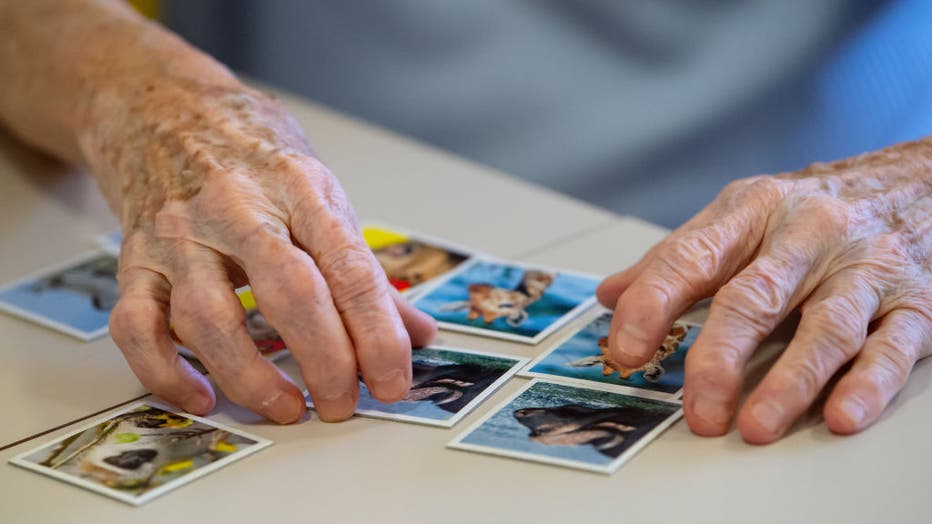Simple memory test could signal Alzheimer's disease years before onset, study suggests
A simple memory test could be able to provide early indications of Alzheimer’s disease before the onset of symptoms and a typical diagnosis, researchers said.
A new study published this month reports that participants who received a lower score on a memory test were found to also have higher amounts of beta-amyloid plaques in the brain — which are biomarkers of Alzheimer’s disease.
"These findings suggest that this test can be used to improve our ability to detect cognitive decline in the stage before people are diagnosed with Alzheimer’s disease," study author Ellen Grober, PhD, and researcher at Albert Einstein College of Medicine in New York said in a statement.
As many as 5.8 million Americans were living with Alzheimer’s disease in 2020, according to estimates from the U.S. Centers for Disease Control and Prevention. The figure is projected to nearly triple to 14 million people by 2060.
Symptoms of Alzheimer’s disease — the most common type of dementia — can first appear after age 60, and the risk increases with age, the CDC said. It’s not yet fully understood what causes the disease, and there are likely several factors that can affect each person differently
The progressive disease begins with mild memory loss, impacting parts of the brain that control thought, memory and language, and can seriously impact a person’s ability to carry out normal daily activities.
Details of the new study involving a simple memory test
The study involved 4,484 people who were an average age of 71 and had no known cognitive issues. During the test, participants were shown pictures of items and given cues about the item’s category, such as a picture of grapes with the cue of "fruit."
People were then asked to remember the items, first on their own, and then with the category cues for any items they couldn’t remember. Researchers said this type of controlled learning helps with the mild memory retrieval problems that occur in many healthy elderly people but does not have much impact on memory for people with dementia.
Based on how they scored in the test, the participants were placed in five groups from 0 to 4. The first three groups were for people who had trouble remembering an item at first but could remember if given clues.
Members in groups three and four had difficulty remembering items even with clues.
The study participants also underwent brain scans to look for the beta-amyloid plaques, as well as to measure the volume of areas of the brain associated with Alzheimer’s pathology.
The researchers found that people who tested in the third and fourth stages were likely to have higher amounts of beta-amyloid in their brains compared to people in the lower stage groups. They were also more likely to have a lower volume in the hippocampus and other areas of the brain associated with Alzheimer’s pathology, researchers said.
At stage zero, 30% of people had beta-amyloid plaques, compared to 31% at stage one, 35% at stage two, 40% at stage three and 44% at stage four, according to the study.
"This system allows us to distinguish between the following: the difficulty people have retrieving memories when they are still able to create and store memories in their brains, which occurs in the very early stages before dementia can be diagnosed; and the memory storage problems that occur later in this pre-dementia phase when people can no longer store the memories in their brains," Grober said.
The study author noted how the test could potentially be helpful in determining who to enroll in clinical trials for the prevention of cognitive decline, in addition to serving as a less expensive and invasive way to detect Alzheimer’s in the brain — compared to scans or lumbar punctures.

FILE IMAGE - A resident of a nursing home plays a memory card game on a nursing ward in a file image taken on Nov. 17, 2020, in Krailling, Germany. (Photo by Sven Hoppe/picture alliance via Getty Images)
One limitation of the study was that the participants had a high level of education, so the results may not be applicable to the general population, the authors said.
The study was published on Feb. 23 in Neurology, which is the medical journal of the American Academy of Neurology. It was funded by the National Institutes of Health, the Alzheimer’s Association, the Cure Alzheimer Fund and Leonard and Sylvia Marx Foundation.
It used publicly available data from the A4 study, which aims to test whether a new investigational treatment, called an anti-amyloid antibody, can slow memory loss caused by Alzheimer’s disease.
RELATED: Life may indeed flash before our eyes when we die, brain wave study suggests
This story was reported from Cincinnati.

